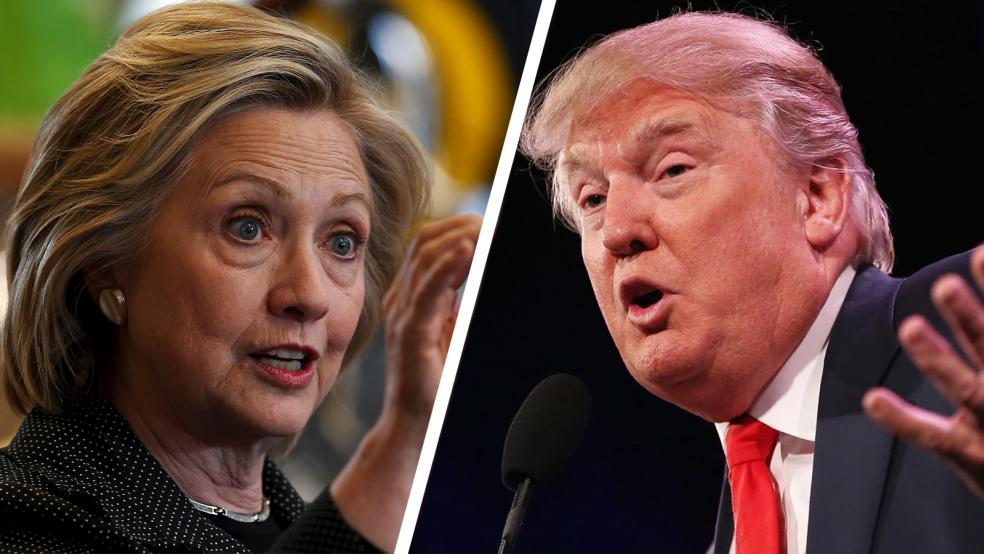Donald Trump has been spending a lot of time in Florida lately, and it’s not because he wants a real tan or the grass on his golf course needs mowing. It’s because if he has any road to the White House, it will likely have to run through the Sunshine State.
Right now, Trump’s chances of winning the presidency are about as likely as Dwayne Johnson winning an Oscar for best actress in a remake of Barbarella.
Related: As Trump Drops in the Polls, the List of GOP Defectors Grows
In just the past two weeks, Trump’s chances of beating Hillary Clinton have been in free fall: On July 30, the data analysis website FiveThirtyEight had Trump at 50.1 percent to 49.9 percent for Clinton. Today, it has Clinton at 86.2 percent and Trump at 13.8 percent. And The New York Times’ Upshot Forecast also gives the former Secretary of State an 86 percent chance of becoming the 45th president.
Yes, of course, it’s a long way to Nov. 8. But that is a stunning reversal, and while the Republican nominee commands plenty of firm support even after he attacked a Gold Star family and aimed the Second Amendment at his foot, his pathway to victory has become ever narrower.
A mid-July analysis in The Wall Street Journal by Republican strategist John Brabender laid out what may be the most plausible scenario right now.
First, Trump would have to capture all 24 states that Mitt Romney won in 2012. That in itself could prove difficult because Trump support has weakened in Arizona and North Carolina is at risk.
Related: Trump Doubles Down on His Claim That Obama Was a ‘Founder’ of ISIS
If he could do that, though, Brabender said, the next big hurdle would be to win two big swing states with large working-class populations. His picks were Ohio and Pennsylvania.
As of now, Clinton has opened up a modest lead in Ohio of 49 percent to 45 percent and a 10-point lead in Pennsylvania.
If Trump could get all of the Romney states, plus Ohio and Pennsylvania, he would have 244 electoral votes, Brabender wrote, and the final challenge would be to win “a collection of states such as Virginia, Colorado and New Hampshire, or win Florida.”
Virginia has promoted Senator Tim Kaine, Clinton’s running mate, to higher and higher offices over the years, and its governor, Terry McAuliffe, has been thick as thieves with the Clintons for decades. So that’s not so promising. And in New Hampshire, Clinton is suddenly leading Trump by between 10 and 15 points in the most recent polls there.
If nothing changes, then, Trump’s best bet would be Florida. The mogul has ties to the state through his Mar-a-Lago Club in Palm Beach; he is said to be close to Governor Rick Scott, and the rival he once belittled, the popular Marco Rubio, is once again running for his Senate seat.
Related: How Marco Rubio Could Save the Senate for the GOP
Amy Walter of the nonpartisan Cook Political Report today addressed the question: “Can Trump catch up?” She noted how much his support had evaporated since May when he was a mere 3 points behind Clinton: For example, he has dropped 14 points among white voters without a college education and 21 points among moderate swing voters. But, she said, “his biggest drops came from those who are the easiest for him to get back.”
An Aug. 9 Quinnipiac Poll found Clinton and Trump tied in Florida at 43-43 in a four-way race with Libertarian Gary Johnson and Green Party nominee Jill Stein. And the well-regarded political scientist Susan MacManus of the University of South Florida pointed out to CNN on Tuesday that Obama won Florida in 2012 “by just over .9 percent.”
Florida has 4.4 million registered Republicans, 4.6 million registered Democrats and 3 million independents. That makes the state, as CNN said, the “swingiest swing state.”
And it could be even more unpredictable than ever. FiveThirtyEight rates Florida the state most likely to tip the election.
Oh, and there’s one more reason for Trump to stump his heart out in the land of gators and Disney World.
“More than 30,000 new Republicans registered to vote in Florida this year,” Brabender wrote, “and many observers believe that Mr. Trump was the driving factor.”





